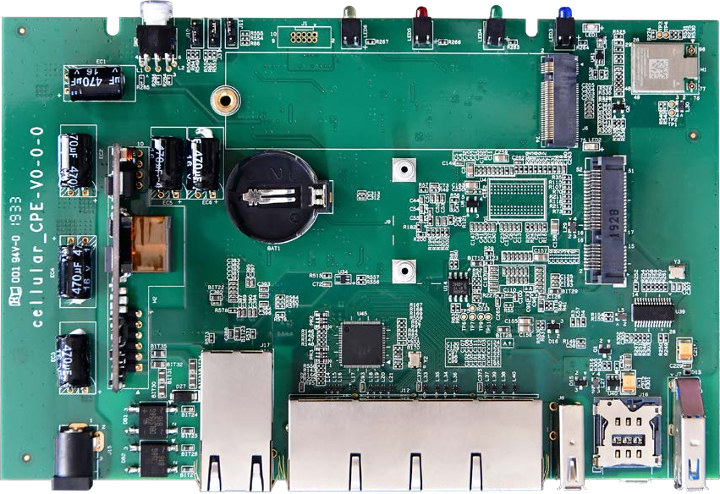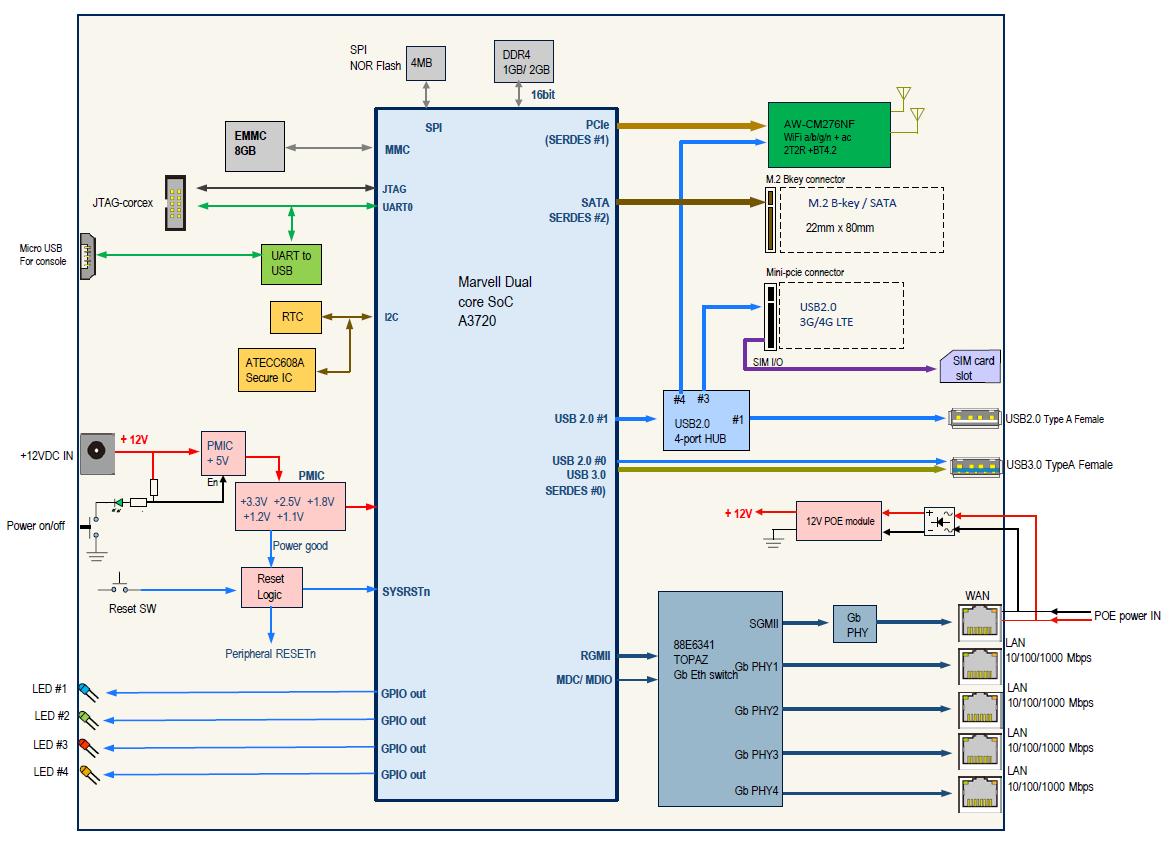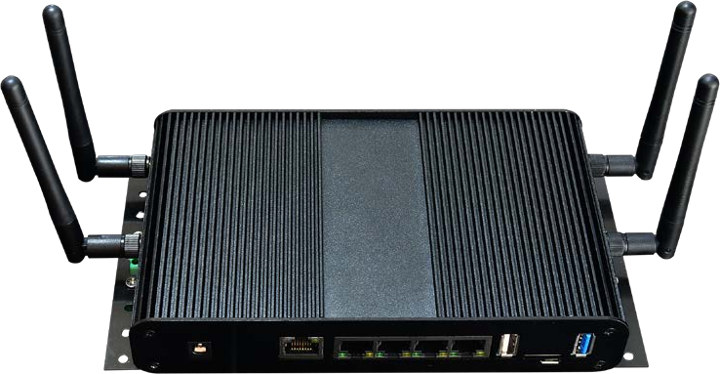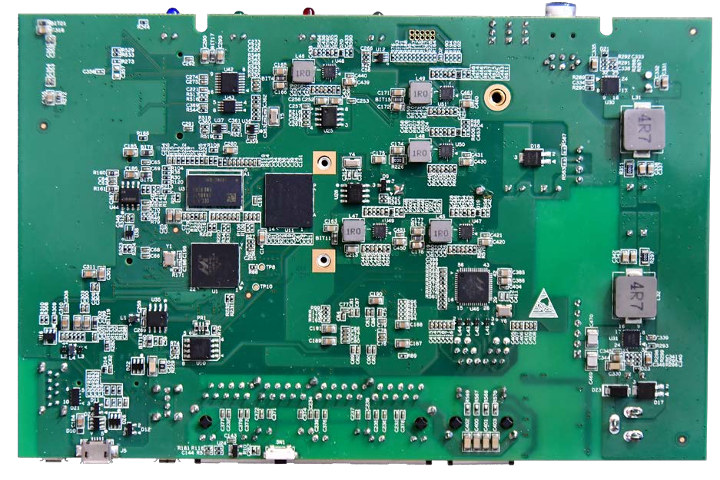Marvell ESPRESSOBin networking board launched in 2016 for as little as $39 with an Armada 3700LP (88F3720) dual-core Arm Cortex A53 processor, up to 1GB RAM, three Gigabit Ethernet ports, SATA, and a mPCIe slot for wireless connectivity.
Globalscale Technologies is now back with ESPRESSOBin ULTRA with a similar base but more features, a metal enclosure, and a much higher price point.
ESPRESSOBin ULTRA specifications:
- SoC – Marvell Armada 3720 dual-core Arm A53 processor clocked up to 1.2 GHz with packet accelerator
- System Memory – 1GB DDR4 (option up to 2GB)
- Storage – 8GB eMMC flash, 4Mbit SPI NOR flash, 1x M.2 2280 slot for SATA SSD
- Connectivity
- Switch – Marvell Topaz 6341 (88E6341) Networking Switch
- 1x GbE WAN with 30W POE
- 4x Gigabit Ethernet ports (LAN)
- 802.11ac Wi-Fi 5 2×2 MIMO module + Bluetooth 4.2
- Optional 4G LTE cellular connectivity via mini PCIe and NanoSIM card slot
- USB – 1x USB 3.0 port, 1x USB 2.0 port
- Expansion
- 1x M.2 2280 B-key slot for SATA drives
- 1x mPCIe slot (USB 2.0) for 3G/4G cellular modem
- Debugging – 1x micro USB UART for serial console, 10-pin JTAG connector
- Misc – RTC Clock and battery, power & reset buttons, 4x user LED’s, ATECC608A secure IC
- Power Supply – 12V via DC Jack or PoE
- Dimensions – 185 x 112 x 35mm
- Weight – 635 grams

The ESPRESSOBin ULTRA 1 unit ships with two WiFi/Bt antennas, a micro USB to USB cable for debugging and a warranty card by default. Optional accessories include a 12V/2A power adapter and two wall-mount DIN rail hooks.
The unit will ship with an updated 4.19 mainline Linux with integrated wireless and networking drivers. There’s no Wiki at this time, but I suppose many of the resources and documentation for its little brother (ESPRESSOBin) may be re-used. The Wiki has documentation for up to Linux 4.14 though, and searches for Linux 4.19 support point me to Armbian instead.
Globalscale ESPRESSOBin ULTRA is scheduled to ship in March 2020, but the company is already taking pre-orders for $159 or $169 with the DIN rail mount. You’ll find more details and the purchase link on the product page.

Thanks to Willy for the tip!

Jean-Luc started CNX Software in 2010 as a part-time endeavor, before quitting his job as a software engineering manager, and starting to write daily news, and reviews full time later in 2011.
Support CNX Software! Donate via cryptocurrencies, become a Patron on Patreon, or purchase goods on Amazon or Aliexpress. We also use affiliate links in articles to earn commissions if you make a purchase after clicking on those links.






This is the WiFi chipset https://www.nxp.com/products/wireless/wi-fi-plus-bluetooth/88w8897-2×2-wi-fi-802.11ac-plus-bluetooth-soc:88W8897
First gen 802.11ac solution from 2012…
It’ll lack a lot of features, but on the plus side, drivers ought to be stable.
The diagram is misleading, as four SERDES lanes are in use, but the one for the Ethernet isn’t highlighted, unlike the other three. As such, all four can’t be used concurrently.
>It’ll lack a lot of features, but on the plus side, drivers ought to be stable.
The drivers a feature-rich but suffer from the driver and firmware getting out of sync that require a reboot to fix.
Wonderful, a seven year old WiFi chip and they still haven’t managed to make it a stable platform…
The driver pack that is/was on the Marvell extra is probably better and has fixes that haven’t filtered down to mainline. I don’t have access to the extranet anymore so I can’t say what kernels those actually work on though.
It’s in NXP’s hands now though.
I feel like they’re spending way too many efforts trying to maintain alive a totally outdated solution which never really took off by lack of momentum. This chip is dog slow, only has a 16-bit memory bus which cripples its performance. The original Espressobin has never run at 1.2 GHz but rather 800 MHz, for a reason I ignore but I suspect is related to consumption and/or heat issues.
And this board looks misdesigned to me: the 88F3720 supports 2500BaseX Ethernet on SGMII. The switch supports this as well on its SGMII port. How did they connect the two ? Using 1 Gbps-only RGMII, and they’ve put a 88E1512 phy on the SGMII port! This is total non-sense! By doing nothing but using the ports correctly they could have supported 2.5 Gbps to the switch and by just using the wrong port they’ve limited the design to 40% its capacity.
This board could possibly make some sense as an entry-level device, but not at this price. For this price tag ($180) you can get a clearfog-pro with 6 switched GigE ports, 1 GigE RJ45 port, and one 1/2.5G SFP, with PCIe/M2, twice as much CPU power, twice the memory bandwidth. And in the same performance range you have the Edge-Router-X with POE + 5 swiched ports connected to a single GigE port with a dual-core 4-thread 880 MHz MIPS for only $55 and in a much smaller form factor… Thus I’d see this device in the sub-$100 range at best.
Indeed. As much as Marvell have tried, they have largely failed to repeat the success of the Armada 38x, and that’s mainly due to their OEMs’ getting severely misguided. They could have seeded the market with ClearFog/TurrisOmnia-class devices at 1/2-to-1/3 the price of the originals, but instead they decided they could enter that price segment without adding anything in the form of justification. Bad move.
>As much as Marvell have tried, they have largely failed to repeat the success of the Armada 38x,
Any sources for that?
I took a look at the datasheet of 88F3720. There are plenty of high speed interfaces, e.g. PCIe, SGMII, but only 3 serdes. Meaning to implement your idea they’ll have to sacrifice USB, SATA or PCIe.
Looks like the board is not aimed at high performance but rich interfaces.
Possibly indeed if RGMII is available in complement to SerDes. Still disappointing design overall. It seems like they could have used the same line for PCIe/SATA given that they are usually exclusive on mini-PCIe or M2 connectors.
While I agree the original Espressobin is dog slow (and has stability problems), I would pin a large amount of blame on Globalscale’s implementation and not Marvell.
I work at a telco, and we built a product around the 3720 SoC (https://github.com/torvalds/linux/commits/master/arch/arm64/boot/dts/marvell/armada-3720-uDPU.dts) with Methode Electronics. This board runs the 3720 and DDR3 memory at 1GHz and we don’t have any stability or heat problems.
In addition to 2.5G SFP support on each network interface (we DIRECTLY connect an SFP cage to each SerDes interface; there is no intermediate switch), we can flip between 1G 2.5G at runtime via Comphy, and have excellent SFP support in Linux via phylink (though we did have to work with Russell King to improve the support with exotic GPON SFP ONT modules).
We’ll also be taking advantage of eXpress Data Path (XDP) support for MVNETA that was added in Linux 5.5. We’ll be leveraging XDP to do forwarding at > 2Gbps through the two SFP cages.
The 3720 isn’t perfect, and I would certainly appreciate a faster (1.6-2GHz version of it), but there is simply no other chip in this class that has 2500BaseX support (and 1G 2.5G switching via comphy), phylink, and XDP support. All while also supporting mainline Linux, instead of shitty SDK.
> The 3720 isn’t perfect, and I would certainly appreciate a faster (1.6-2GHz version of it), but there is simply no other chip in this class that has 2500BaseX support (and 1G 2.5G switching via comphy), phylink, and XDP support
Actually there is, the armada 38x does have this as well, is a dual-A9 up to 2GHz with 32b DDR3 so it is way faster, and runs mainline too. I’m also using my clearfog at 2.5G on linux 5.4 with comphy, and yes a great work was done in this area!
Yes, we’re aware of the A388, and in hindsight (after realizing the A3720’s forwarding performance is impacted by limited memory bandwidth) we wish we selected it. However, it’s not exactly the same class as the A3720, or a drop-in replacement:
– A388 is 17mm * 17mm, versus the A3720’s 10.5mm x 11mm, which makes the A388 ~2.4x larger. This would impact the board layout, requiring a costly/complicated board redesign, and probably a new enclosure.
– A388 uses almost twice as much power as the A3720. While this wouldn’t be a show stopper, our current uDPU network device currently sits around < 10watt with both SFP cages populated (both with ~2watt SFP modules). Switching this to the A388 would bump power consumption by around 20%, which would impact our ability to use ETSI reverse powering (similar to PoE, but can provide power over telephone grade twisted pair). The higher power would reduce the loop lengths at which we could provide reverse powering. Probably not a show stopper for our use cases (typically < 100m loops), but something we'd have to consider.
– A388 lacks ARMv8 support, again not a show stopper, but its nice having a clean 64bit userland and kernel in OpenWRT =).
– A388's mvneta implementation has hardware buffer management, which is currently incompatible with the memory model used for XDP in the mvneta driver. Hopefully, it'll be fixed eventually, but is currently an issue.
Ideally, I'd wish Marvell would release an i-temp hardened 1.4GHz version of the A3720, with corresponding 1.4GHz DDR4 support. 40% boost in memory performance would go a long way to relieving some of the A3720's problems. Marvell, I hope you're listening!
>The original Espressobin has never run at 1.2 GHz but rather 800 MHz,
>for a reason I ignore but I suspect is related to consumption and/or heat issues.
Both of mine are running 1GHz without any stability issues. 200+ days up time with the CPUs pegged most of the time.
Eagerly awaiting a dual gigabit arm router board that can shape 500-750Mbps at a 50-75$ price point – something along the lines of the Odroid H2, Banana pi R2/64.
Shittiest capacitors possible, on a $170 device, computer motherboards stopped using ones like these back in the last century.
Not true and electrolyte capacitors are plenty fine if they’re from a quality manufacturer.
I think they were talking about the brand not the type. The original espressobins have some off brand cap for the input filtering and this is probably the same deal.